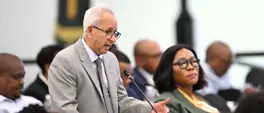Johannesburg municipal execs perform poorly, yet earn multi-million-rand salaries
Kabous Le Roux
25 November 2025 | 7:46Are Johannesburg's municipal entity executives worth their impressive salaries? We interview Professor Alex van den Heever of the Wits School of Governance.

Picture: Marcbruxelle/123rf.com
Long-suffering residents of South Africa’s largest, richest city are asking whether municipal executives are worth their multi-million-rand salaries. Recent revelations show staggering compensation packages for those running the city's essential services, despite widespread service delivery failures.
According to reporting by Anna Cox, the heads of Johannesburg's municipal entities command impressive salaries:
- City Power's executive earns nearly R5 million annually
- Pick It Up's leader takes home R4.5 million
- Joburg Water executives earn R3.75 million annually
- Joburg Roads Agency execs yearly earn R4.7 million
These figures significantly exceed compensation for similar positions elsewhere in the country.
Professor Alex van der Heever from the Wits School of Governance offers a scathing assessment of this situation. "The problem that we have in Johannesburg is that these entities that have these very high-paying individuals have performed very, very poorly, and they show virtually no vision in how they take forward the city," he states. "If you were paying people that amount of money and you had proper corporate governance that was independent and operating in the interests of Johannesburg, you would have seen more. But we see far less."
The disconnect between executive compensation and organisational performance appears systemic. City Power, despite being ‘functionally bankrupt’ according to van der Heever, continues rewarding its leadership handsomely. Similarly, the Joburg Property Company, which he describes as ‘a complete catastrophe’ that has ‘allowed hijacked buildings all over the place’, maintains generous executive packages.
Van der Heever points to fundamental governance issues: "Once you have potential political appointments into the board structure, it means that the appointment of the chief executive or the accounting officer of the very entity becomes problematic because they're not there because they're the best person for the job, and they're also not held to account for what they do properly."
This broken accountability structure extends throughout the city's management. Most concerning is that the bulk of organisational resources appears concentrated at the top rather than directed toward service delivery.
"Most of the money goes to the top executive team, not to the organisation itself,"van der Heever notes.
The absence of performance benchmarks compounds these issues. Without clear metrics for success or consequences for failure, executives continue receiving premium compensation regardless of outcomes. In the private sector, such underperformance would likely result in leadership changes.
This examination of Johannesburg's municipal leadership compensation raises critical questions about governance, accountability, and value for money in South Africa's economic hub. To hear the complete discussion with Van der Heever and understand the full implications of these compensation practices on city services, listen to the podcast below in which we explore potential solutions to this governance crisis:
Get the whole picture 💡
Take a look at the topic timeline for all related articles.














